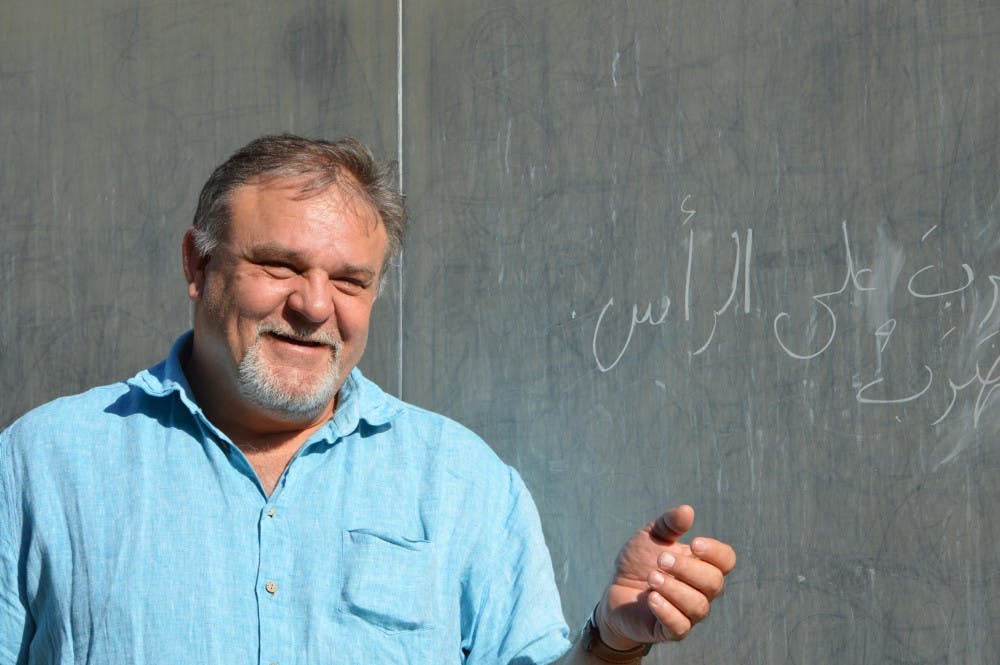Editor's note: Logan Etheredge is a member of The Collegian staff.
It takes 2,200 hours to achieve professional working proficiency in Arabic, based on the Foreign Service Institute’s 70 years of experience teaching foreign languages to diplomats.
The FSI has labeled Arabic a Category IV language – the most difficult for native English speakers to learn. In comparison, Spanish, a Category I language, takes about 600 hours to learn.
It is perhaps just as hard to find qualified professors to teach Arabic as it is to learn it.
Junior Christopher Rein, an Arabic major who was recently awarded the U.S. Department of State’s Critical Language Scholarship, has had five different Arabic professors since he started studying the language at the University of Richmond.
“It’s really frustrating,” Rein said.
Despite the challenges the high turnover rate of professors in the Arabic program brings, there has been one constant: Martin Sulzer-Reichel, the director of the Arabic language program.
When Sulzer-Reichel started working at UR as a part-time German instructor in 2001, the Arabic program did not exist.
After non-credit Arabic classes became popular with students, Sulzer-Reichel was asked to start an Arabic program, which was piloted from 2006 to 2009, he said. At first, only 100-level classes were offered, but the program slowly grew until 200-level classes were also available.
Building a program from scratch and helping it grow and develop all while juggling a rotating faculty, and, of course, teaching, is no easy task. Rein said he believed Sulzer-Reichel did this through sheer force of will.
Today the program consists of three professors -- Sulzer-Reichel, Alaa Magableh and Shaheed Coovadia -- and attracts three to five majors per year.
Sulzer-Reichel has witnessed firsthand the difficulties of finding professors to teach Arabic. Great scholars of Arabic, do not necessarily have the ability to teach the language well to beginners, he said.
Enjoy what you're reading?
Signup for our newsletter
Although Sulzer-Reichel acknowledged that the high turnover rate is difficult for students at times, he said he believed it was a good thing, too.
“It’s easy to get used to the teaching style of one person,” Sulzer-Reichel said. “If they go on to grad school, they will have someone different. They need to learn the language through different media, personalities and methods.”
Olivier Delers, the chair of the languages, literatures and cultures department, agreed that finding someone who is able to teach Arabic well is challenging.
“That’s where Martin really excels, teaching those crucial four or five first courses to ensure that the students stay with it,” Delers said.
Freshman Logan Etheredge is one of the few students majoring in Arabic. Although Etheredge came to UR interested in studying international studies with an Arabic concentration, after taking a few classes in the Arabic program, she decided to instead major in both Arabic and women, gender and sexuality studies.
“Part of why I think I stayed with the program and felt that it was good as a full major instead of a concentration is that Martin – my Arabic professor and basically the Arabic department – he is just awesome,” Etheredge said.
Rein and Etheredge both agreed that Sulzer-Reichel genuinely cares about making sure his students learn Arabic.
“My biggest wish is that students study because they want to learn something, not because they want to get a grade, a major, a minor,” Sulzer-Reichel said.
Although Sulzer-Reichel stumbled into teaching, he said he had found the work rewarding.
“I’m excited if I get the chance to help students develop, not just learn a skill, but develop in the formative years between 18 and 22,” Sulzer-Reichel said.
Delers said he believed that Sulzer-Reichel was a good professor because he was a very curious and generous person who wanted to learn with his students and never said no.
This curiosity led Sulzer-Reichel to explore remote teaching, which has proved particularly beneficial for Rein, who has been able to study Persian by taking the class online and having weekly Skype calls with a professor at the University of Virginia.
“He’s absolutely dedicated to making sure students learn whatever it is they’re interested in,” Rein said.
Sulzer-Reichel said he believed that anybody who dealt with the Arabic and Muslim world should have the option to learn Persian, Farsi and Turkish. Remote teaching makes this possible, especially for students at smaller schools with limited resources, and he said he hoped it would be accepted as a viable option.
Many students from colleges in Virginia dial in to Sulzer-Reichel’s classes, Delers said. Although remote teaching brings unique challenges, such as a lack of human contact and connectivity issues, Sulzer-Reichel does more than is expected to help all of his students succeed, Delers said.
“He actually makes sure that he talks to his students once a week on Skype and will even travel to their schools,” Delers said.
"Martin is not someone who looks for recognition, but he deserves it."
Contact features writer Caroline Robelen at caroline.robelen@richmond.edu.
Support independent student media
You can make a tax-deductible donation by clicking the button below, which takes you to our secure PayPal account. The page is set up to receive contributions in whatever amount you designate. We look forward to using the money we raise to further our mission of providing honest and accurate information to students, faculty, staff, alumni and others in the general public.
Donate Now



